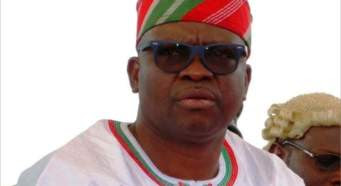Court summons EFCC, Zenith Bank to defend freezing of Fayose’s account - Premium Times
The Federal High Court, Ado-Ekiti, has summoned the Economic and Financial Crimes Commission and the Zenith Bank Plc to show why an order exparte to unfreeze Governor Ayodele Fayose’s accounts now before it should not be granted.
Presiding judge, Taiwo Taiwo, gave Monday, July 4, 2016 for the EFCC (1st defendant) and the bank (2nd defendant) to appear before him with the necessary evidence.
Counsel to Mr. Fayose, Mike Ozekhome, had through an ex parte order, deposed to by Bimpe Olatemiju, sought a mandatory order unfreezing the accounts belonging to him pending the determination of his interlocutory application.
He sought the leave of the court for the service of the originating summons on the defendants in their various addresses outside the jurisdiction of the court as contained on the order papers, supported by 17-paragraph affidavit.
Mr. Ozekhome said the order was brought pursuant to order 26 rule 8(1) of the Federal High Court Civil Procedure Rule 2009 and Section 44(1) of the 1999 constitution which gives the court the discretionary powers to adjudicate on such matter.
Citing the case of Abdulaziz Nyako Vs EFCC, he argued that the anti-graft agency had no power to freeze Mr. Fayose’s account without a valid court order.
Mr. Ozekhome added the action was a flagrant negation of the Section 308 of the Constitution, which conferred absolute immunity on the government against civil and criminal procedure.
He said it was appalling that the EFCC could play ostrich to these valid constitutional requirements before taking the punitive stand against Mr. Fayose, adding that these infractions had rendered the action unconstitutional, wrongful, and null and void.
The judge said that he quite understood that the applicant (Fayose) enjoys immunity and that the court could adjudicate on the matter as canvassed by the counsel to the plaintiff, but he pointed out that the relief he basically sought was a mandatory order of the court.
“I quite agree that the applicant has immunity pursuant to provisions of the constitution, but it is glaring that the application he is requesting for is a mandatory order to undo what had already been done and the court can’t abdicate its duty under this circumstance,” said the judge.
“I am of the opinion that this mandatory order is better granted with the interlocutory order being sought through an application pending before the court, because the applicant has filed all papers to this effect.
“I hereby order the 1st and 2nd respondents to appear before this honourable court on July 4, 2016 and show cause why the order should be refused.
“This is not a refusal of the order, I have not refused it, but I only put it in abeyance which I said without prejudice to what will be the position of the respondents.
“But a leave is granted for the service of the defendants with the originating summons in their respective addresses as contained on the order papers.”
Speaking to PREMIUM TIMES on the phone on Tuesday, Mr. Ozekhome said Mr. Fayose has a very strong case against the EFCC, relying on Section 308 of the Constitution.
He said he accepted the judge’s ruling, which gives the EFCC to opportunity to show why the order should not be granted.
“Our motion was an exparte for the de-freezing and removal of restriction placed on citizen Ayodele Fayose’s two accounts with the Zenith Bank Plc,” he said.
“The bank claimed through a letter made available to our client that it acted on the instructions of the EFCC and we are here by way of originating summons to say that the EFCC has no powers, whether under the EFCC Act, money laundering Act, under the constitution or any other known law to freeze the accounts of a sitting governor who enjoys immunity under section 308 of the Constitution of Federal Republic of Nigeria, 1999 as altered because that section makes it clear that for the time that person is in that office, the President, Vice-President, Governor and Deputy-Governor he enjoys absolute immunity from any civil or criminal procedure and that no court process can issue against such person.
“So, EFCC could not have obtained an order Exparte to freeze his account, if they did that, it is illegal, null and void. It could also not have frozen his accounts without having an order Exparte.”




Comments
Post a Comment